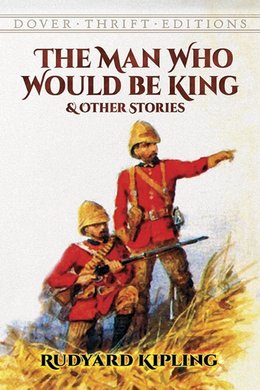
-
EPUB 98 KB
-
Kindle 126 KB
-
Support epubBooks by making a small $2.99 PayPal donation purchase.
Description
Two former British soldiers who were sent in the early 19th century to British controlled India to search for adventure end up becoming kings of Kafiristan. This story is inspired by Josiah Harlan, an American adventurer who claimed the title of Prince of Ghor after leding a military force into Afghanistan in the mid-19th century.
56 pages with a reading time of ~60 minutes (14202 words), and first published in 1888. This DRM-Free edition published by epubBooks, 2010.
Community Reviews
There are currently no other reviews for this book.
Excerpt
“Brother to a Prince and fellow to a beggar if he be found worthy.” The Law, as quoted, lays down a fair conduct of life, and one not easy to follow. I have been fellow to a beggar again and again under circumstances which prevented either of us finding out whether the other was worthy. I have still to be brother to a Prince, though I once came near to kinship with what might have been a veritable King and was promised the reversion of a Kingdom —army, law-courts, revenue and policy all complete. But, to-day, I greatly fear that my King is dead, and if I want a crown I must go and hunt it for myself. The beginning of everything was in a railway train upon the road to Mhow from Ajmir. There had been a deficit in the Budget, which necessitated travelling, not Second-class, which is only half as dear as First-class, but by Intermediate, which is very awful indeed. There are no cushions in the Intermediate class, and the population are either Intermediate, which is Eurasian, or native, which for a long night journey is nasty; or Loafer, which is amusing though intoxicated. Intermediates do not patronize refreshment-rooms. They carry their food in bundles and pots, and buy sweets from the native sweetmeat-sellers, and drink the roadside water. That is why in the hot weather Intermediates are taken out of the carriages dead, and in all weathers are most properly looked down upon. My particular Intermediate happened to be empty till I reached Nasirabad, when a huge gentleman in shirt-sleeves entered, and, following the custom of Intermediates, passed the time of day. He was a wanderer and a vagabond like myself, but with an educated taste for whiskey. He told tales of things he had seen and done, of out-of-the-way corners of the Empire into which he had penetrated, and of adventures in which he risked his life for a few days’ food. “If India was filled with men like you and me, not knowing more than the crows where they’d get their next day’s rations, it isn’t seventy millions of revenue the land would be paying—it’s seven hundred million,” said he; and as I looked at his mouth and chin I was disposed to agree with him. We talked politics—the politics of Loaferdom that sees things from the underside where the lath and plaster is not smoothed off—and we talked postal arrangements because my friend wanted to send a telegram back from the next station to Ajmir, which is the turning-off place from the Bombay to the Mhow line as you travel westward. My friend had no money beyond eight annas which he wanted for dinner, and I had no money at all, owing to the hitch in the Budget before mentioned. Further, I was going into a wilderness where, though I should resume touch with the Treasury, there were no telegraph offices. I was, therefore, unable to help him in any way. “We might threaten a Station-master, and make him send a wire on tick,” said my friend, “but that’d mean inquiries for you and for me, and I’ve got my hands full these days. Did you say you are travelling back along this line within any days?” “Within ten,” I said. “Can’t you make it eight?” said he. “Mine is rather urgent business.” “I can send your telegram within ten days if that will serve you,” I said. “I couldn’t trust the wire to fetch him now I think of it. It’s this way. He leaves Delhi on the 23d for Bombay. That means he’ll be running through Ajmir about the night of the 23d.” “But I’m going into the Indian Desert,” I explained. “Well and good,” said he. “You’ll be changing at Marwar Junction to get into Jodhpore territory—you must do that—and he’ll be coming through Marwar Junction in the early morning of the 24th by the Bombay Mail. Can you be at Marwar Junction on that time? ’Twon’t be inconveniencing you because I know that there’s precious few pickings to be got out of these Central India States—even though you pretend to be correspondent of the Backwoodsman.” “Have you ever tried that trick?” I asked. “Again and again, but the Residents find you out, and then you get escorted to the Border before you’ve time to get your knife into them. But about my friend here. I must give him a word o’ mouth to tell him what’s come to me or else he won’t know where to go. I would take it more than kind of you if you was to come out of Central India in time to catch him at Marwar Junction, and say to him:—‘He has gone South for the week.’ He’ll know what that means. He’s a big man with a red beard, and a great swell he is. You’ll find him sleeping like a gentleman with all his luggage round him in a second-class compartment. But don’t you be afraid. Slip down the window, and say:—‘He has gone South for the week,’ and he’ll tumble. It’s only cutting your time of stay in those parts by two days. I ask you as a stranger—going to the West,” he said with emphasis. “Where have you come from?” said I.
